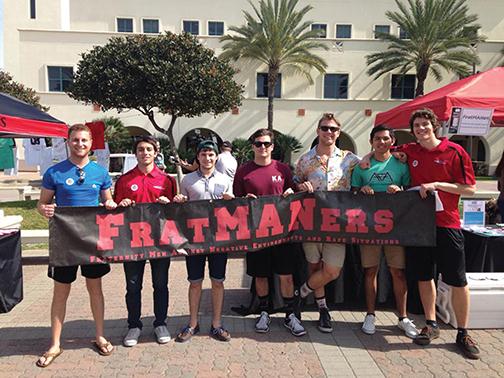
About 100 San Diego State students gathered in front of Hepner Hall Wednesday afternoon for the #NotSilentBecause rally to promote awareness for sexual assault and rape.
As a part of the Take Back the Week series presented by SDSU Sisster (Sororities Invested in Survivor Support, Training, and Ending Rape Culture), FratMANers (Fraternity Men Against Negative Environments and Rape Situations), SDSU Health Promotion and Student Life and Leadership, students had the chance to learn about sexual assault statistics, hear others’ stories regarding sexual assault and learn more about the services the school provides at the student health center.
FratMANers member and Associated Students Executive Vice President-elect Nick Wohlman helped coordinate the festivities and clarified the main objectives of the rally.
“The #NotSilentBecause rally attempts to provide awareness for issues surrounding sexual violence, rape and provides survivor support,” Wohlman said.
Wohlman said the rally is important because it allows students to talk about why they aren’t silent about sexual assault and rape.
“It’s about why we shouldn’t be silent about these issues and provides students the opportunity to learn about on-campus resources and to talk about why we aren’t silent,” Wohlman said.
The rally began in front of Hepner Hall where SDSU alumnus Ian Fielden shared statistics of sexual assault and rape in college and why #NotSilentBecause was so important to him.
“My ‘why’ of why I’m here today is because one in four women are sexually assaulted in college,” Fielden said.
Fielden said in 2014, SDSU fraternities were put on probation and were required to attend classes and seminars put on by FratMANers. This is what inspired him to pursue the issue of sexual assault and work to make a change on campus.
As the rally continued, students walked toward the donor wall on Campanile Walkway. There, they were greeted by staff of the Well-Being and Health Promotion Department at SDSU.
One of the women was Health Educator Samantha Martinez. She described the different resources Calpulli, the student health center at SDSU, offers for students who are in need of psychological services, counseling, etc.
Wohlman expressed his gratitude for the work Samantha Martinez and her colleagues have accomplished.
“The work that Stephanie Waits Galia and Samantha Martinez have done is amazing,” Wohlman said. “The fact that SDSU has programs like FratMANers and Sisster should not go unrecognized.”
The third destination of the rally was on the first floor of the Calpulli center where students were educated by one of the nurse practitioners on the different medications, exams and labs Calpulli has in order to treat students health needs.
She also touched on the different services the counseling and psychological services department offers for SDSU students. She specifically mentioned the workshops offered such as “Test Anxiety” and “Baxter the therapy dog.”
The fourth and final destination was on the fourth floor of the Calpulli center in the counseling and psychological services office. There, students of the rally were welcomed by the keynote speaker, Liat Wexler from the Center for Community Solutions.
“SDSU has improved and taken strides to get better and end rape culture,” Wexler said.
Wexler gave a presentation on rape culture that involved interactive portions which allowed students to give their responses and feedback according to rape culture questions and comments via their cell phones that projected on the screen.
Junior Speech Hearing Language Sciences major Kat McGrail found the interactive portion of the presentation to be influential in response to ending rape culture on the SDSU campus.
“This made the whole presentation even more powerful because for some questions, I saw some of the same responses as mine, as well as different ones,” McGrail said. “It just goes to show that though students on this campus are not all from the same background, we have similar reasons for supporting the #NotSilentBecause moment.”
“What does it mean to be silent?” Wexler asked the group. “Being a bystander, because being an upstander is so difficult.”
Wexler said college students who are LGBTQ, Native American or involved in a sorority are the three groups with highest risk of being sexually assaulted.
“Sorority women have a stronger culture of drinking and it creates a vulnerability for people to take advantage of,” Wexler said.
By the end of the rally, members shared why they are #NotSilentBecause. These responses were anonymous and included: “I want our future generations to be safe,” “my sister was sexually assaulted,” and “I’m a victim.”
McGrail gave recommendations on how students can make a change on campus.
“Starting with a helping a friend in need, lending a listening ear and providing those who have been personally affected by sexual assault,” McGrail said. “The support and resources that they need will begin to spark the change we need to see here on campus.”
Wohlman says that the issue of sexual assault and rape is something everyone should take into consideration and not ignore.
“This is an issue that affects everyone and in my opinion, neutrality only favors the oppressor,” Wohlman said. “I want to do whatever I can to prevent it.”






